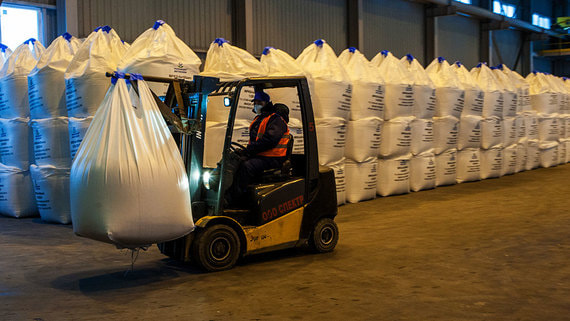EUobserver: EU agrees to ease sanctions on several Russian entrepreneurs
[ad_1]

Representatives of the EU countries agreed on a partial easing of sanctions against several Russian entrepreneurs involved in the production of fertilizers, writes portal EUobserver with reference to diplomatic sources.
The easing of sanctions is said to affect Andrey Melnichenko and his wife Alexandra, Andrey Guryev, Vyacheslav Kantor, Dmitry Mazepin and Vadim Moshkovich. All of them are now included in the EU sanctions list – they are denied entry to the territory of the association, and their assets are frozen due to support for the Russian special operation in Ukraine.
The easing of sanctions, agreed by the EU ambassadors at the meeting on December 15, implies the possibility for individual EU countries to unfreeze the funds of these businessmen, if necessary, to finance the supply of food and fertilizer, especially to Africa. To do this, countries will have to consult with the European Commission.
This measure was opposed by Poland and the Baltic countries, which, as it became known earlier, believe that Russian entrepreneurs will abuse this “loophole” in the EU sanctions regime. Representatives of these countries threatened to block the easing of sanctions if funds were unfrozen immediately in all EU countries. However, the exceptions were supported by EU heavyweights Germany, France and the Netherlands, as well as Belgium, Italy, Portugal and Spain. As a result, after 11 hours of discussion, the parties were able to reach a compromise.
“We cannot risk starvation and food shortages due to EU sanctions rules that are unenforceable for port authorities,” one diplomat told the portal.
The issue of easing restrictions on Russian exports of fertilizers has led to a protracted discussion by the EU of the ninth package of sanctions against Russia. As early as December 12, the head of EU diplomacy, Josep Borrell, said that negotiations were continuing due to the clarification of “necessary exceptions” needed to “minimize collateral damage.” After the meeting of representatives of the EU countries on December 14, it became knownthat the disagreement is about whether the EU should facilitate the export of Russian fertilizers through European ports, even in cases where they are produced by companies whose owners are on the sanctions list. At the meeting on December 15, EU countries could agree on new restrictions that will be officially announced today, December 16th.
Since the start of Russia’s special operation in Ukraine, the EU has already imposed eight packages of sanctions against Russia. The previous one was adopted on 6 October. In particular, it included limiting the cost of oil. It went into effect on December 5th. The EU countries have agreed on a price ceiling for Russian oil of $60 per barrel.
[ad_2]
Source link








